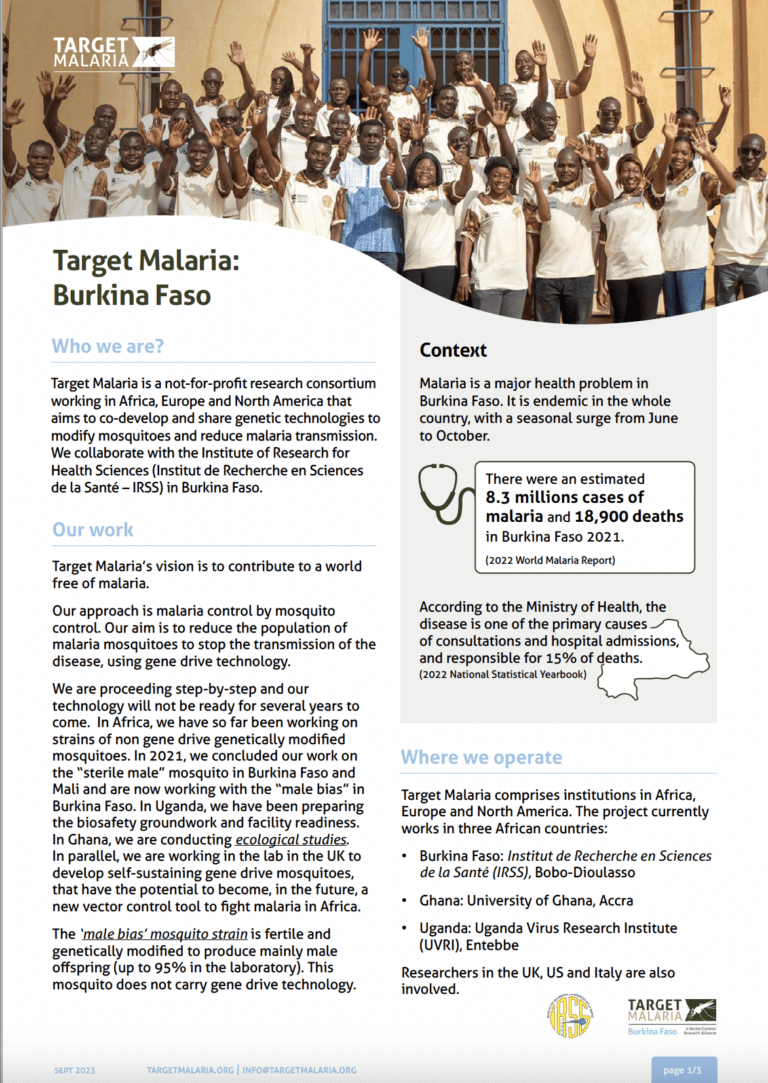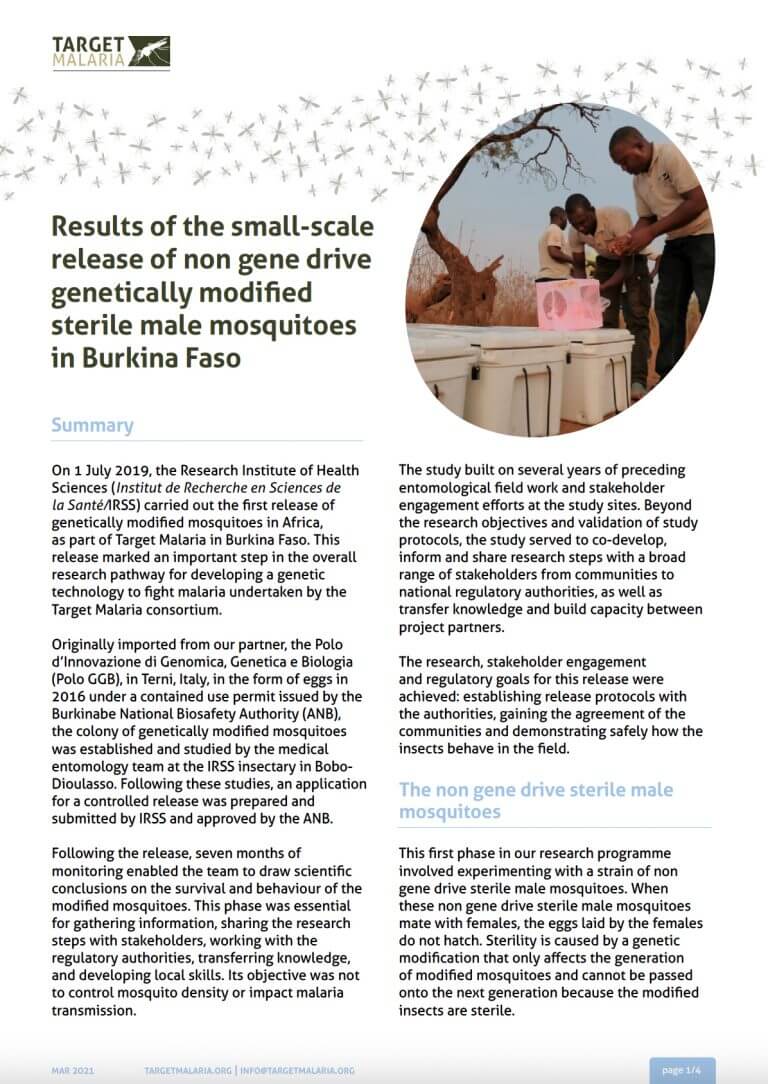Home › Who We Are › Where We Operate in Africa › Burkina Faso
Burkina Faso
Target Malaria’s team in Burkina Faso works in collaboration with the Institut de Recherche en Sciences de la Santé (IRSS), based in Bobo-Dioulasso and is headed by Professor Abdoulaye Diabaté.
Context of our work
Malaria is endemic throughout Burkina Faso, and all the population is at risk of getting infected. According to the Ministry of Health, the disease accounts for 43% of consultations with a health provider, over 60% of hospitalisations and 30% of deaths. In 2023, the WHO noted that there were an estimated 8,1 million malaria cases and over 16,146 estimated malaria associated deaths in the country.
Target Malaria’s work in Burkina Faso is led by the Institut de Recherche en Sciences de la Santé (IRSS) in Bobo-Dioulasso, and headed by the Principal Investigator Prof. Abdoulaye Diabaté. The IRSS is active in the fields of public health, biomedical science, traditional medicine, and pharmaceuticals. Our team at the IRSS joined Target Malaria in 2012, and since then Target Malaria Burkina Faso has focused on collection of baseline entomology data to better understand what species of mosquitoes are present, their seasonal dynamics and behaviour in the natural environment. We have completed what the project refers to as “Facilities Readiness” for our insectary at IRSS, ensuring compliance with international Arthropod Containment Level 2 (ACL) guidelines. We have also engaged with the different stakeholders to keep them informed of what the project is doing and our plans for the future.
As co-development is one of Target Malaria’s core values, the team decided early on that the communities where we worked should design the agreement model. A dialogue was established to agree on a set of principles, namely – transparency, inclusiveness, and openness to different perspectives – and from this base the communities designed their own agreement model. They chose to establish a reference community group, representing the whole community that would communicate any decisions made by them to the project, after their consultation.
After gaining the necessary permit from the National Biosafety Agency (Agence Nationale de Biosécurité-ANB), the national competent authority in Burkina Faso, the team worked on non gene drive genetically modified sterile male mosquitoes – a phase of the stepwise approach to develop Target Malaria’s genetic technologies for malaria vector control. These studies built on the competencies and training acquired during the facilities readiness process allowing the team to hone their skills further. Requesting a permit for contained use from the ANB also helps to understand regulatory processes and strengthen the dialogue with stakeholders.
In July 2019 the team achieved a major milestone, the first release of non gene drive genetically modified mosquitoes – the first of its kind on the African continent. The modified mosquitoes were sterile males and therefore unable to pass on their genes in the wild. The village of Bana was selected to be the release site, as agreed per the agreement model developed by the community itself. The release helped the project to collect scientific data on mosquito flight patterns, dispersal, and their longevity.
The release was a success, and the team have provided feedback to the key stakeholders that were involved. The results from the release were published in February 2022 in Nature Communications.
In 2022, the IRSS team embarked on a new phase of work on the non gene drive genetically modified male bias mosquitoes. Following approval from regulatory authorities and community agreement, the team imported the male bias strain for contained use work in their Arthropod Containment Level 2 (ACL-2) insectary in Bobo-Dioulasso in 2022. Burkina Faso is again the first country in Africa to import and conduct contained use studies on the male bias strain. It follows the three years of successful work on the non gene drive genetically modified sterile male mosquitoes.
For more information: read our factsheet on the non gene drive genetically modified male bias mosquito
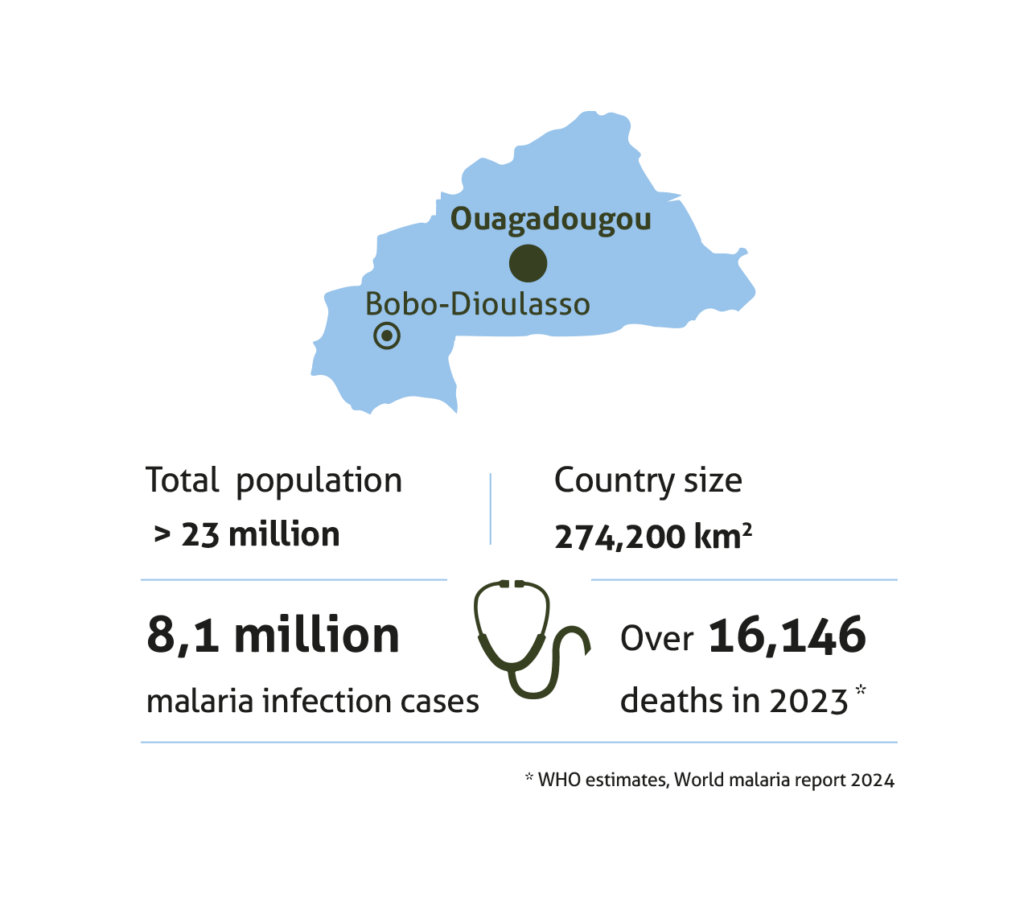

Prof. Abdoulaye Diabaté
Target Malaria Burkina Faso's Principal Investigator
Professor Abdoulaye Diabaté is Head of Medical Entomology and Parasitology at the Research Institute in Health Sciences (Institut de Recherche en Science de la Santé (IRSS) /Centre Muraz) in Bobo-Dioulasso, Burkina Faso and the Principal Investigator of Target Malaria Burkina Faso.

Our Burkinabé Team
Target Malaria Burkina Faso is based at the regional directorate of the Institute for Research in Health Sciences (IRSS) in Bobo-Dioulasso. It is supported by a dynamic and competent team, made up of biomedical entomologists, molecular biologists and microbiologists, socio-anthropologists, specialists in stakeholder engagement and communication, quality assurance and specialist insectary staff. The team are led by the Principal Investigator, who is supported by a co-PI and project manager. Researchers working on the project also act as mentors for PhD and Master’s students from Burkina Faso and other African countries.
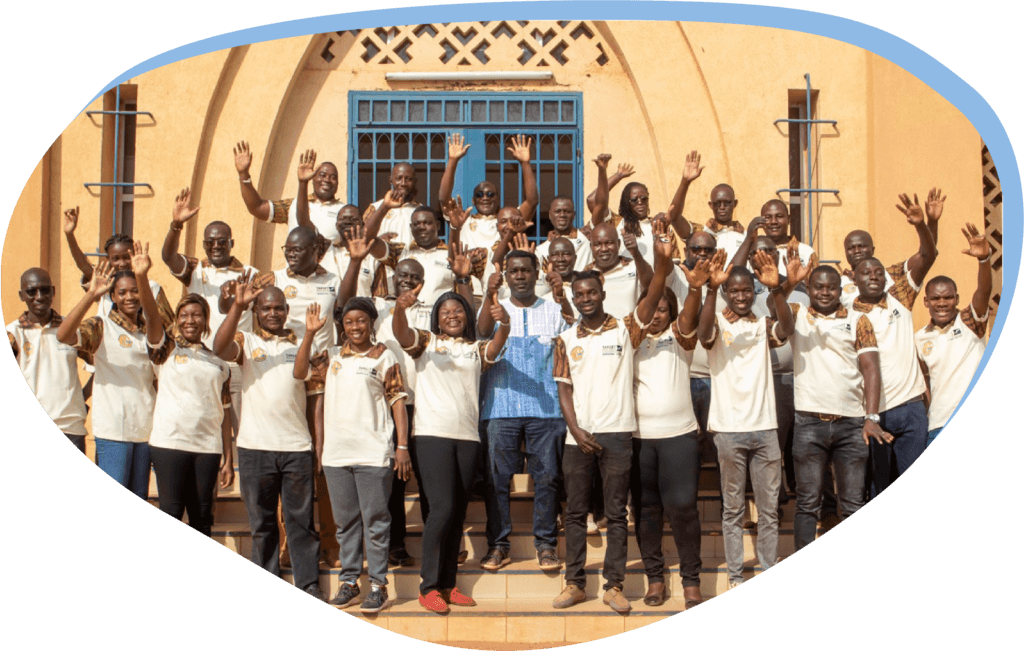

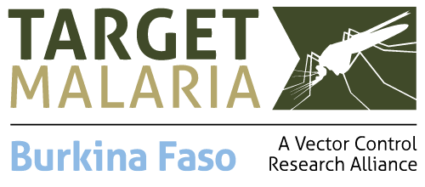
Latest from Burkina Faso
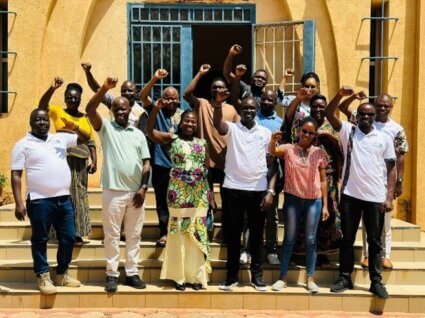
Target Malaria Uganda and Burkina Faso teams share stakeholder engagement experiences
A delegation from Target Malaria Uganda’s Stakeholder Engagement team traveled to Bobo-Dioulasso, Burkina Faso, for a vital learning and knowledge sharing visit. The purpose of
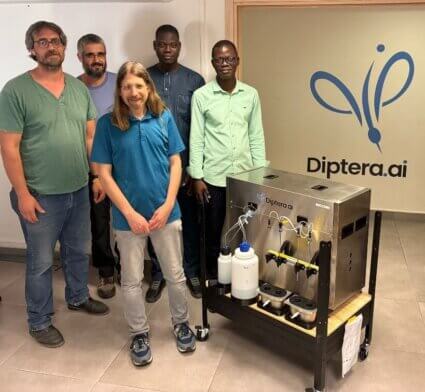
Partnering with Diptera.ai to build the tech capacity of African research institutes to use the technologies of tomorrow
For the past year, Target Malaria has partnered with Diptera.ai, a mission-driven biotech startup that is working to make vector control technology, like gene drive,
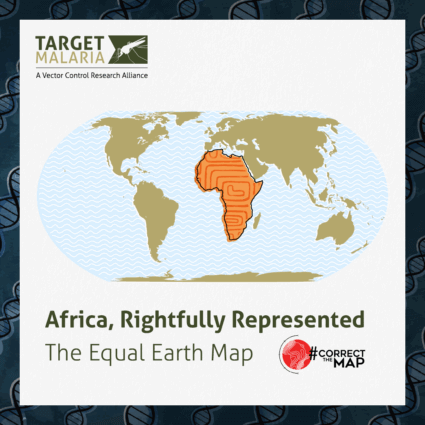
Africa Day 2025: We are joining the #CorrectTheMap movement
For centuries, the world has been shown through the Mercator projection, created in 1569, which distorts the size of countries in the Global North in

